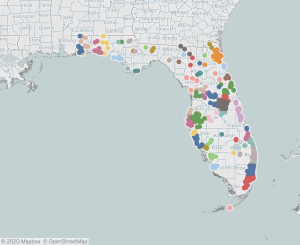Florida Reopening: Phase 3
- Restaurants and food service establishments may operate at full capacity with limited social
distancing protocols.
- Bars, pubs, and nightclubs that derive more than 50 percent of sales from alcohol should
operate at full capacity with limited social distancing protocols.
- Operators of retail businesses should operate at full capacity but should continue to
maintain adequate sanitation practices for employees and patrons.
- Gyms and Fitness centers should open to full capacity but should maintain adequate
sanitation practices among employees and patrons during all hours of operation.
- Personal Services Businesses, such as cosmetology salons, barber shops and nail salons,
should operate under full capacity but should continue to maintain adequate sanitation practices for employees and patrons.
- Vacation Rentals should resume normal operating procedures but should continue to
thoroughly clean and disinfect the property between rentals.
- Individuals older than 65 years of age and individuals with a serious underlying medical
condition (such as chronic lung disease, moderate-to-severe asthma, serious heart
conditions, immune-compromised status, cancer, diabetes, severe obesity, renal failure and
liver disease) can resume public interactions, but should practice social distancing,
minimizing exposure to social settings where distancing may not be practical, unless
precautionary measures are observed.
- Non-vulnerable populations should consider minimizing time spent in crowded
environments.
- Face masks are recommended but not required for those in face-to-face interactions and where you can’t social distance. Counties vary for face mask requirements. Read more here.
- Read the full Phase 3 Guidelines here.
COVID-19 Testing Locations
COVID-19 Information
- Up-to-date Coronavirus information is available here.
- An up-to-date overview of Coronavirus cases in the United States is available here.
- A current overview of cases in Florida is available here.
- State Vaccination plan is available here.
- How to know if you’re at higher risk of getting very sick from the Coronavirus.
- How to find your county health department.
CDC Symptoms to Watch for
- Reported illnesses have ranged from mild symptoms to severe illness and death for confirmed coronavirus disease 2019 (COVID-19) cases.
- The following symptoms may appear 2-14 days after exposure.
- Fever
- Cough
- Shortness of breath
CDC FAQ
- Am I at risk for COVID-19 in the US? This is a rapidly evolving situation and the risk assessment may change daily. The latest updates are available on CDC’s Coronavirus Disease 2019 (COVID-19) website.
- Should I cancel or postpone my trip? CDC provides recommendations on postponing or canceling travel. These are called travel notices and are based on assessment of the potential health risks involved with traveling to a certain area. A list of destinations with travel notices is available here.
- What is the risk of getting sick on an airplane? Because of how air circulates and is filtered on airplanes, most viruses and other germs do not spread easily on airplanes. Although the risk of infection on an airplane is low, travelers should try to avoid contact with sick passengers and wash their hands often with soap and water for at least 20 seconds or use hand sanitizer that contain 60%–95% alcohol.
- What are the symptoms and complications that COVID-19 can cause? Current symptoms reported for patients with COVID-19 have included mild to severe respiratory illness with fever, cough, and difficulty breathing. Read about COVID-19 Symptoms.
- Should I be tested for COVID-19? If you develop symptoms such as fever, cough, and/or difficulty breathing, and have been in close contact with a person known to have COVID-19 or have recently traveled from an area with ongoing spread of COVID-19, stay home and call your healthcare provider. Older patients and individuals who have severe underlying medical conditions or are immunocompromised should contact their healthcare provider early, even if their illness is mild. If you have severe symptoms, such as persistent pain or pressure in the chest, new confusion or inability to arouse, or bluish lips of face, contact your healthcare provider or emergency room and seek care immediately. Your doctor will determine if you have signs and symptoms of COVID-19 and whether you should be tested.
- Other Frequently Asked Questions are available here.
|






